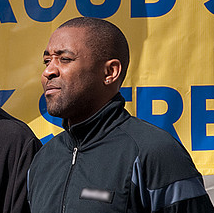Darren Campbell
 | ||||||||||||||||||||||||||||||||||||||||||||||||||||||||||
| Data i miejsce urodzenia | 12 września 1973 | |||||||||||||||||||||||||||||||||||||||||||||||||||||||||
|---|---|---|---|---|---|---|---|---|---|---|---|---|---|---|---|---|---|---|---|---|---|---|---|---|---|---|---|---|---|---|---|---|---|---|---|---|---|---|---|---|---|---|---|---|---|---|---|---|---|---|---|---|---|---|---|---|---|---|
| Dorobek medalowy | ||||||||||||||||||||||||||||||||||||||||||||||||||||||||||
| ||||||||||||||||||||||||||||||||||||||||||||||||||||||||||
Darren Campbell (ur. 12 września 1973 w Manchesterze) – brytyjski lekkoatleta, sprinter, wielokrotny medalista igrzysk olimpijskich i mistrzostw świata.
Największe sukcesy w startach indywidualnych osiągał w biegu na 100 metrów:
- złoto na mistrzostwach Europy juniorów w 1991 w Salonikach
- srebrny medal podczas mistrzostw świata juniorów w 1992 w Seulu
- złoto na mistrzostwach Europy w 1998 w Budapeszcie
- 1. miejsce w Pucharze Europy w 2000 w Gateshead
- 6. lokata podczas letnich igrzysk olimpijskich w 2000 w Sydney
- srebrny medal na mistrzostwach Europy w 2002 w Monachium
- brąz podczas mistrzostw świata w 2003 w Paryżu
Osiągnięcia w biegu na 200 metrów:
- złoto na mistrzostwach Europy juniorów w 1991 w Salonikach
- srebrny medal podczas mistrzostw świata juniorów w 1992 w Seulu
- srebro na letnich igrzyskach olimpijskich w 2000 w Sydney
- brąz podczas Igrzysk Wspólnoty Narodów w 2002 w Manchesterze
- 4. miejsce na mistrzostwach świata w 2003 w Paryżu
Największe sukcesy Campbella związane są jednak z udziałem w sztafecie 4 × 100 metrów:
- złoto na mistrzostwach Europy juniorów w 1991 w Salonikach
- złoty medal podczas mistrzostw świata Juniorów w 1992 w Seulu
- brąz na mistrzostwach świata w 1997 w Atenach
- złoto podczas mistrzostw Europy w 1998 w Budapeszcie
- złoty medal na Igrzyskach Wspólnoty Narodów w 1998 w Kuala Lumpur
- srebrny medal podczas mistrzostw świata w 1991 w Sewilli
- 1. miejsce w Pucharze Europy w 1999 w Paryżu
- 1. miejsce w Pucharze Europy w 2000 w Gateshead
- złoty medal podczas mistrzostw Europy w 2002 w Monachium – odebrany z powodu dopingu Dwaina Chambersa
- złoto na Igrzyskach Wspólnoty Narodów w 2002 w Manchesterze
- złoto podczas mistrzostw świata w 2003 w Paryżu – odebrany z powodu dopingu Dwaina Chambersa
- złoty medal na letnich igrzyskach olimpijskich w 2004 w Atenach
- złoto podczas mistrzostw Europy w 2006 w Göteborgu
Wynik uzyskany podczas mistrzostw świata w Sewilli 29 sierpnia 1999) – 37,73 s – jest aktualnym rekordem Europy; sztafeta brytyjska pobiegła w składzie: Jason Gardener, Darren Campbell, Marlon Devonish oraz Dwain Chambers.
Rekordy życiowe
- Bieg na 100 metrów – 10,04 s (1998)
- Bieg na 200 metrów – 20,13 s (2000)
- Bieg na 50 metrów (hala) – 5,77 s (1999)
- Bieg na 60 metrów (hala) – 6,59 s (2003)
Linki zewnętrzne
- Darren Campbell w bazie World Athletics (ang.).
- Wyniki olimpijskie Campbella na stronie Sports-Reference.com (ang.). [dostęp 2009-10-04]. [zarchiwizowane z tego adresu (1 września 2009)].
- Darren Campbell, [w:] tilastopaja.eu [online] [dostęp 2020-03-26] (ang.).
Media użyte na tej stronie
Pictograms of Olympic sports – . This is an unofficial sample picture. Images of official Olympic pictograms for 1948 Summer Olympics and all Summer Olympics since 1964 can be found in corresponding Official Reports.
Flag of England. Saint George's cross (a red cross on a white background), used as the Flag of England, the Italian city of Genoa and various other places.
The flag of Navassa Island is simply the United States flag. It does not have a "local" flag or "unofficial" flag; it is an uninhabited island. The version with a profile view was based on Flags of the World and as a fictional design has no status warranting a place on any Wiki. It was made up by a random person with no connection to the island, it has never flown on the island, and it has never received any sort of recognition or validation by any authority. The person quoted on that page has no authority to bestow a flag, "unofficial" or otherwise, on the island.
Flag of the unified Team of Germany for the Olympic Games, 1960–1968.
Flag of Jamaica. “The sunshine, the land is green, and the people are strong and bold” is the symbolism of the colours of the flag. GOLD represents the natural wealth and beauty of sunlight; GREEN represents hope and agricultural resources; BLACK represents the strength and creativity of the people. The original symbolism, however, was "Hardships there are, but the land is green, and the sun shineth", where BLACK represented the hardships being faced.
Autor:
- Linford_Christie_-_Darren_Campbell_2009.jpg: Klingon50 from Atherton, UK
- derivative work: Leovilok (talk)
Darren Campbell in Chinatown, Manchester









